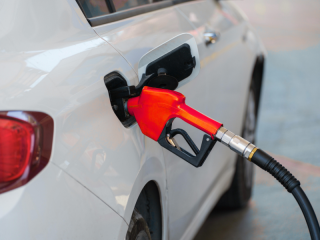
Fuel is one of the biggest expenses that motorists have to contend with but there are steps that businesses can take to save money.
In this guide, we will focus on how to make the most of every litre, how to change the way you drive to save money on fuel and consider different measures that your business can implement to cut fuel costs.
Changes to make to your vehicle that will save money on fuel
Optimise engine performance
Having an engine that’s well-tuned and performing to its full potential is critical to improving fuel economy. So always follow your car manufacturer’s recommendations on how best to service your vehicle’s engine.
Remove extra weight
Review what’s in the boot of your car, in your van, inside your cab or on your lorry. The EPA reports that, on average, every extra 50kg will increase your fuel consumption by up to 2%. A small percentage that really adds up over a year.
Only buy the fuel you need
Rather than driving around with a full tank, it’s recommended to only buy the fuel you need as this will help your fuel go slightly further. Although this may seem more inconvenient, think about how much weight you’re carrying around when you’ve got 100 litres of fuel in your tank.
Be as aerodynamic as possible
There is an increased focus by car designers on making vehicles as aerodynamic as possible. The RAC recommend that you don’t drive with open windows and don’t leave a roof box or roof rails on your vehicle unless necessary to make your vehicle more aerodynamic. This will make your vehicles more fuel-efficient and save you money in the long term.
Invest in better tyres
Research conducted by Which? reveals that good quality ‘eco’ tyres can improve fuel economy by up to 6%. By investing in better, and more eco-friendly tyres, you could reduce your annual fuel bill by more than £50. This would also help to lower your CO2 emissions and reduce the number of times you need to replace your tyres.
Inflate your tyres correctly
According to research by TyreSafe, UK motorists waste between £600million and £1billion on unnecessary bills due to driving with underinflated tyres. Therefore, it’s important to ensure that your tyres are inflated correctly as this can save you money on fuel and make your tyres less susceptible to failure.
How to change the way you drive to save money on fuel
Don’t idle
Running a vehicle when it’s not moving is commonly known as idling and is not only bad for the environment but can also be very expensive, particularly for HGV vehicles. Idling uses unnecessary fuel which can result in annual costs of over £3000 per HGV vehicle.
By reducing this habit, you can reduce fuel consumption and C02 emissions which will be beneficial for your business.
Use your engine stop/start
If your vehicle has stop/start functionality you can save yourself some money. This type of system is a handy alternative to switching your engine off and on again and a more fuel-efficient choice than keeping your car running when stopped at traffic lights.
Drive steady and slower
High and inconsistent speeds can have a negative impact on your fuel efficiency, as driving faster will increase wind resistance on your vehicle. It’s more fuel-efficient to travel at lower and regular speeds as much as possible.
Drive in a higher gear
Whenever it’s possible and safe to do so, change up a gear without labouring your engine or redlining your rev counter. Driving in a higher gear means you lower your engine speed, which in turn can improve fuel efficiency.
Drive gently when your vehicle is cold
Vehicles that are cold are more inefficient, particularly if you drive quickly after starting up your vehicle as you will be doubling up on wasted fuel and wear out your engine quicker. That’s why it’s important to initially take it easy on your vehicle after you fire it up.
Don’t drain your battery
Anything that puts a drain on your battery will impact your fuel economy. You should try to use air conditioning as little as possible and remember to turn off heated seats and steering wheels when they are no longer needed.
It’s also a good idea to make sure your battery is properly maintained as a battery in poor condition can also increase fuel costs.
Plan your trip in advance
Before heading out in your car, van or lorry, plan when you will need to refuel and where you can do this. This should prevent the need to buy expensive fuel on motorways and instead purchase cheaper fuel at local petrol stations and supermarkets.
You can use our handy site locator to find participating petrol stations for your fuel card.
Make small driving adjustments
Many drivers form lifelong bad habits which increase their fuel costs throughout their time on the road. However, by changing your driver behaviour, you can start to save money.
For example, slow down early to let traffic lights change, rather than stopping completely; speed up a little before you reach the foot of a hill, and leave a sensible distance between you and the car in front so you can brake evenly.
Take an advanced driving course
All the above points should help improve your driving and save you money on fuel costs. But if you want to take this to the next level, it may well be worth going on an advanced driving course. This will help you to learn how to drive more safely, more effectively and in a more economical way.
Additional things you can do to save money on fuel
Find out how much you really spend on fuel
To ensure that you’re not overspending on fuel, it’s vital to know how much your vehicle or fleet is costing you to run each week, month, or year before you start to look to save money. This will give you an accurate guideline which can then be used as a comparison when you begin to introduce new ways of driving.
Install a telematics system
Investing in a telematics system is beneficial for businesses as the data can be used to reduce fuel costs. Telematics combines a GPS system with on-board diagnostics so you can:
Assess the miles per gallon/litre performance of all the vehicles in your fleet.
Identify the best routes for your vehicles so less fuel is used.
Monitor poor driver behaviour, such as fuel inefficiency.
Use a fuel card
We have an extensive range of fuel cards, to choose from which can help you save money on fuel costs. We offer fixed weekly price fuel cards and pump price fuel cards, and our expert team are on hand to help determine which is best for your business.
Our fuel cards deliver the following benefits:
A fixed weekly price for fuel that is closely linked to the wholesale fuel market, helping you to save money.
No interest charges applied to fuel purchases.
A reduction in admin costs because invoices and VAT are much easier to manage.
Every transaction is tracked, and your company will be billed directly, minimising the risk of fuel fraud.
Take advantage of money-off vouchers
With some of our fuel cards, you can collect supermarket reward points which often give you exclusive discounts. This is a fantastic incentive for drivers who refuel regularly.
Use the fuel recommended to you
Always check the manual for your car, van, or lorry to find out what type of fuel your vehicle’s manufacturer recommends for you to use. By sticking to this advice, your vehicle should perform better, and you should avoid paying for expensive fuel that you may not need.
Consider alternative fuels
Electric vehicles are often cheaper to run than their ICE counterparts. Save extra money by recharging at home when possible, plus you'll be reducing your greenhouse gas emissions at the same time. Explore our EV charge cards which offer a convenient payment solution for businesses switching to electric.




